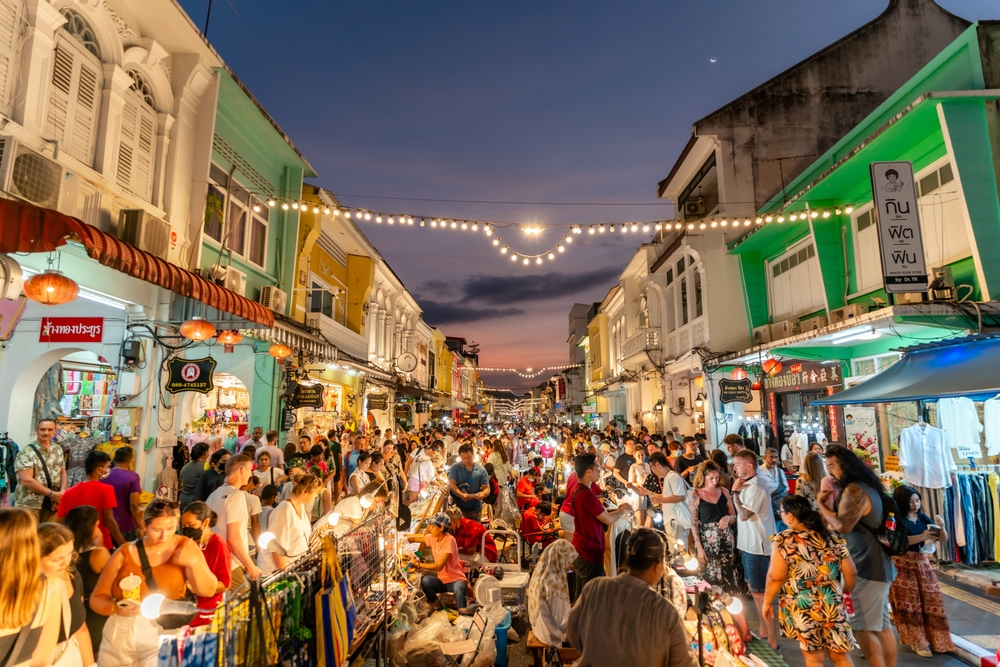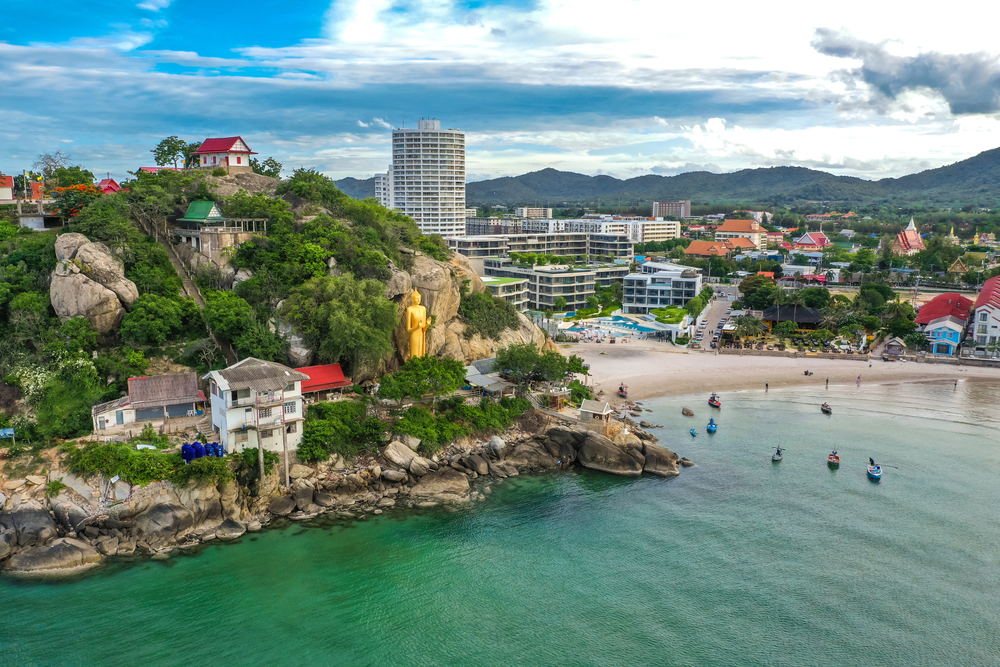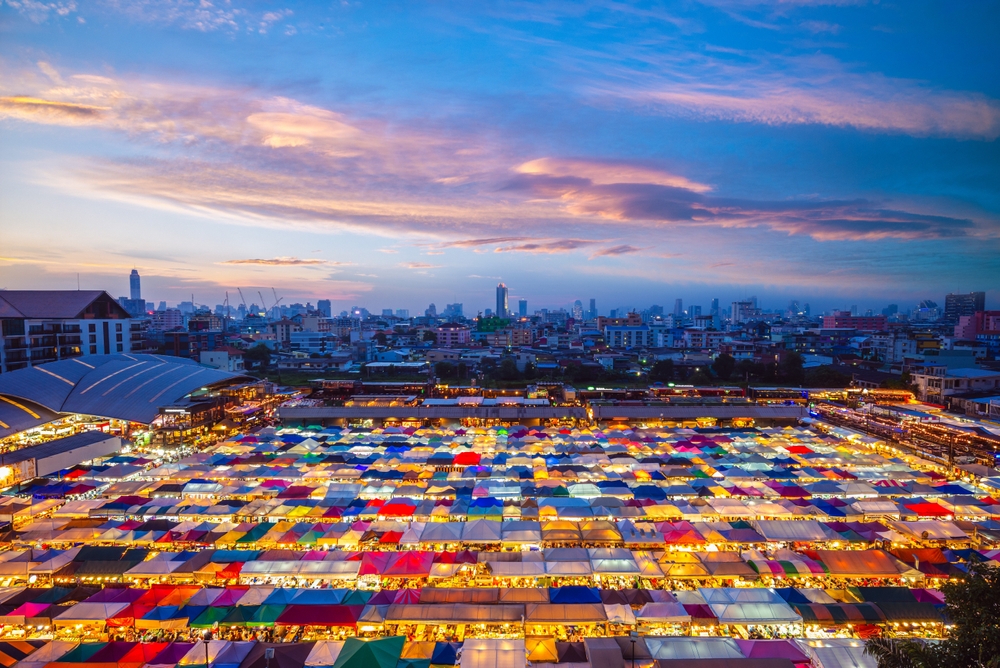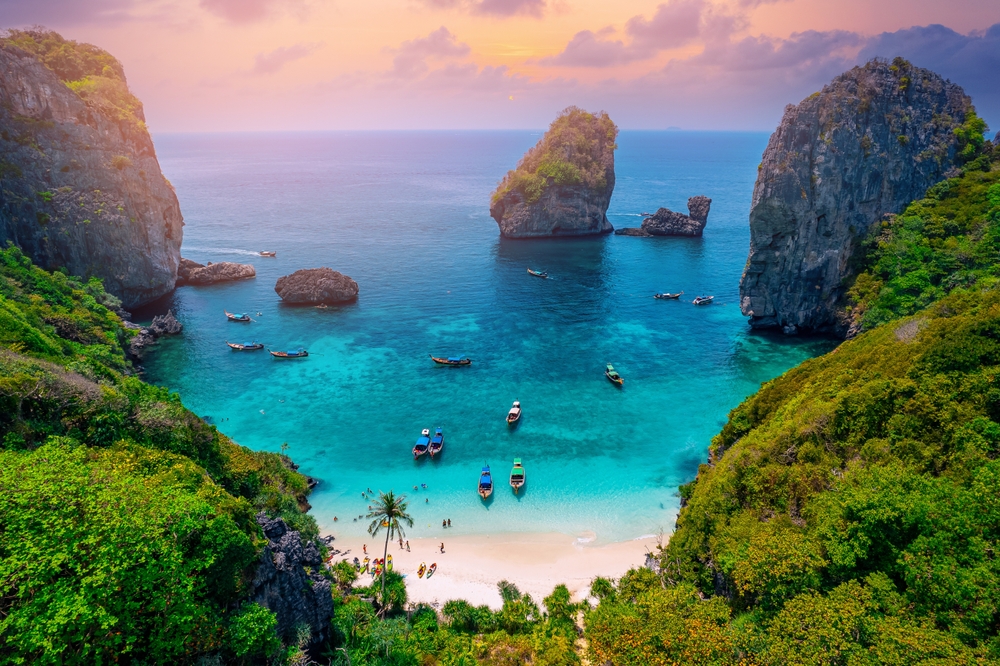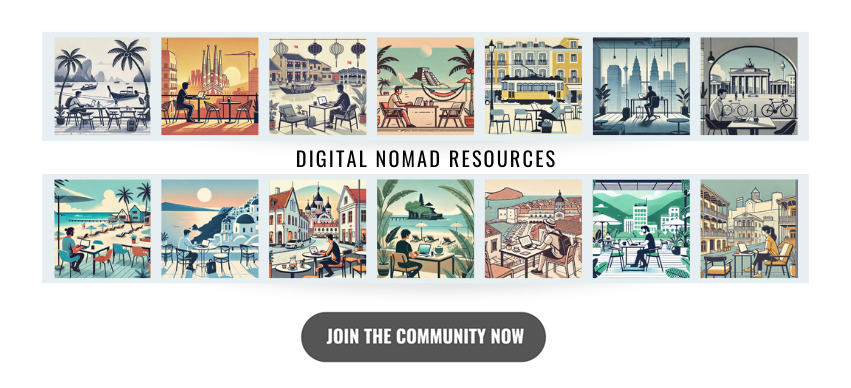Quick Answer: Thailand offers digital nomads multiple visa options including the new Destination Thailand Visa (5 years for $15,000 investment), tourist visas, and education visas. Monthly living costs start around $800-1,200, with excellent internet infrastructure in major cities and a massive expat community. The country combines tropical lifestyle with modern amenities and Buddhist culture.
Table of Contents
-
Thailand’s Visa Options for Digital Nomads
Why Choose Thailand for Remote Work
Top Cities and Destinations
Living Costs and Budgeting
Internet and Infrastructure
Practical Considerations
Legal and Tax Information
Healthcare and Safety
Cultural Integration
Challenges to Consider
Frequently Asked Questions
Conclusion
Thailand’s Visa Options for Digital Nomads
Current Visa Pathways for Remote Workers
Thailand offers several visa options for digital nomads, though no dedicated “Digital Nomad Visa” currently exists. However, new programs launched in 2022-2024 provide attractive alternatives.
Destination Thailand Visa (DTV) – New in 2024
Thailand’s Premium Long-Stay Option
Launched in June 2024, the DTV is Thailand’s most attractive option for digital nomads seeking long-term stays.
Key Details of the Destination Thailand Visa:
- Duration: 5 years, multiple entry
- Financial Requirement: $15,000 (500,000 THB) in bank account
- Income Requirement: Remote work or freelance income proof
- Processing Time: 15 working days
- Application Fee: Approximately $280 (10,000 THB)
- Work Authorization: Remote work for foreign companies permitted
- Family: Dependents can be included
- Activities: Also covers medical tourism, sports training, cultural activities
- Extensions: 180 days per entry, extendable for 180 more days
Tourist Visa Options
Visa Exemption (Most Common)
- Duration: 30 days (extendable once for 30 more days)
- Eligible Countries: 64 countries including US, EU, UK, Australia
- Requirements: Valid passport, onward travel proof (rarely checked)
- Cost: Free entry, $60 for 30-day extension
- Limitations: Technically prohibits work, though remote work generally tolerated
Tourist Visa (TR)
- Duration: 60 days (extendable once for 30 more days)
- Application: Thai embassy/consulate before travel
- Requirements: Proof of funds, accommodation, onward travel
- Cost: $40-80 depending on embassy
- Benefits: Longer initial stay than visa exemption
Education Visa (ED)
Popular Among Long-Term Digital Nomads
The ED visa remains popular for nomads seeking extended stays through legitimate education.
Education Visa Details:
- Duration: 1 year (renewable)
- Requirements: Enrollment in Thai language or cultural courses
- Study obligation: Attend classes 2-4 times per week
- Cost: $200-400 for visa plus course fees
- Benefits: Legal long-term stay with periodic check-ins
- Providers: Language schools throughout Thailand
Elite Visa Program
Premium Residence Option
For high-net-worth digital nomads seeking VIP treatment and long-term security.
Elite Visa Options:
- Elite Easy Access: 5 years for $17,000
- Elite Family Excursion: 5 years family package for $25,000
- Elite Ultimate Privilege: 20 years for $65,000
- Benefits: VIP airport services, golf privileges, spa treatments
- Target: Wealthy nomads seeking premium lifestyle
How Do Thailand’s Visa Options Compare to Regional Competitors?
| Country | Best Option | Duration | Investment/Income | Key Advantage |
| Thailand | DTV | 5 years | $15,000 bank balance | Longest stay, tropical lifestyle |
| Malaysia | MM2H | 10 years | $120,000 deposit | Longer duration, lower daily costs |
| Philippines | SRRV | Permanent | $10,000-50,000 | Permanent residency option |
| Vietnam | E-Visa | 90 days | None | Affordable, no investment |
| Indonesia | B211A | 180 days total | None | Island paradise, budget-friendly |
Thailand’s DTV offers the best balance of duration, requirements, and lifestyle benefits in Southeast Asia.
Why Choose Thailand for Remote Work
What Makes Thailand Special for Remote Workers?
Thailand offers unique advantages that have made it the epicenter of Southeast Asian digital nomadism for over a decade.
Lifestyle and Cultural Advantages
- Tropical climate with beaches, islands, and mountains
- Rich Buddhist culture emphasizing mindfulness and balance
- World-renowned cuisine with incredible variety and affordability
- Massage culture and wellness opportunities (traditional Thai massage)
- Vibrant expat communities in multiple cities
- English widely spoken in tourist and business areas
Economic Benefits
- Exceptional value for money across all lifestyle categories
- Strong Thai Baht provides stability
- Low cost of living allows for higher savings rates
- Affordable domestic travel for exploring the country
- No foreign exchange restrictions
Infrastructure and Connectivity
- Excellent internet infrastructure in urban areas
- Well-developed tourism infrastructure
- Efficient domestic transportation (planes, trains, buses)
- Modern healthcare system with medical tourism industry
- International airports in Bangkok, Chiang Mai, Phuket, and other cities
Geographic and Strategic Advantages
- Central location for exploring Southeast Asia
- Short flights to major Asian cities
- Diverse geography from beaches to mountains to cities
- Year-round warm climate (though with distinct seasons)
- Easy visa runs to neighboring countries
Top Cities and Destinations
Bangkok: The Urban Powerhouse
Why Choose Bangkok for Remote Work?
Thailand’s capital offers the country’s most sophisticated infrastructure while maintaining authentic Thai character and energy.
Digital Infrastructure in Bangkok
- Excellent fiber internet coverage (100-1000 Mbps widely available)
- Massive coworking ecosystem including Hubba-TO, TCDC, and WeWork
- Day passes: $8-20
- Monthly memberships: $100-300
- Countless cafes with reliable WiFi and AC
Living Costs in Bangkok
- Budget lifestyle: $800-1,200/month
- Comfortable lifestyle: $1,400-2,200/month
- Luxury lifestyle: $2,800+/month
Best Areas for Digital Nomads
- Sukhumvit: International area with excellent transport (BTS Skytrain)
- Silom: Business district with modern amenities
- Sathorn: Upscale area with luxury condos and offices
- Ari: Hip neighborhood popular with young professionals
- Thonglor: Trendy area with international dining and nightlife
Pros and Cons of Bangkok ✅ Pros:
- Best internet and infrastructure in Thailand
- Largest variety of international food and services
- Excellent public transportation (BTS, MRT, boats)
- Major international airport hub (Suvarnabhumi, Don Mueang)
- Massive expat and nomad community
❌ Cons:
- Air pollution, especially during burning season
- Traffic congestion despite good public transport
- Intense heat and humidity year-round
- Noise pollution and urban density
- Distance from beaches (2+ hours to nearest coast)
Chiang Mai: The Digital Nomad Capital
What Makes Chiang Mai Special for Digital Nomads?
Northern Thailand’s cultural capital has earned recognition as one of the world’s top digital nomad destinations.
Digital Scene in Chiang Mai
- Pioneering nomad community dating back over a decade
- Extensive coworking spaces including CAMP, Maya Lifestyle, and Punspace
- Regular nomad meetups, conferences, and networking events
- High concentration of international remote workers
Chiang Mai Living Costs
- Budget lifestyle: $600-900/month
- Comfortable lifestyle: $1,000-1,600/month
- Luxury lifestyle: $2,200+/month
Benefits of Chiang Mai for Remote Workers
- Most affordable major city in Thailand
- Cooler climate due to mountain location
- Rich cultural heritage with temples and festivals
- Easy access to nature and outdoor activities
- Strong sense of community among expats
- Excellent northern Thai cuisine
Seasonal Considerations
- Cool Season (November-February): Perfect weather, peak nomad season
- Hot Season (March-May): Very hot, burning season affects air quality
- Rainy Season (June-October): Cooler but humid, fewer crowds
Koh Phangan: The Island Paradise
Digital Nomad Life on Thailand’s Party Island
Beyond its Full Moon Party reputation, Koh Phangan has developed into a serious nomad destination.
Koh Phangan Digital Infrastructure
- Improving internet connectivity island-wide
- Several coworking spaces and nomad-friendly cafes
- Growing community of long-term international residents
- Beach and jungle work environments
Island Living Costs
- Budget lifestyle: $700-1,000/month
- Comfortable lifestyle: $1,200-1,800/month
- Luxury lifestyle: $2,500+/month
Why Choose Koh Phangan
- Beautiful beaches and clear waters
- Vibrant wellness and yoga scene
- Lower costs than Koh Samui or Phuket
- Regular boat connections to mainland
- Growing food scene with international options
- Perfect for combining work with island lifestyle
Phuket: The Developed Beach Destination
Thailand’s International Island Hub
Phuket offers the most developed beach destination with international amenities.
Phuket Advantages
- International airport with direct flights worldwide
- Best developed beach infrastructure in Thailand
- High-speed internet and modern amenities
- Established expat communities
- Diverse beach options from party scenes to quiet coves
Phuket Living Costs
- Budget lifestyle: $1,000-1,400/month
- Comfortable lifestyle: $1,600-2,400/month
- Luxury lifestyle: $3,200+/month
Koh Samui: The Tropical Business Hub
Palm-Fringed Island with Serious Infrastructure
Koh Samui combines tropical beauty with business-friendly environment.
Samui Benefits
- Excellent internet infrastructure for an island
- International airport with connections throughout Asia
- Beautiful beaches with variety of atmospheres
- Growing coworking and business community
- Less crowded than Phuket
- Good healthcare facilities for an island location
Hua Hin: The Royal Retreat
Beachside Living with Vintage Charm
This royal resort town offers a more relaxed alternative to busy beach destinations.
Hua Hin Advantages
- Easy access from Bangkok (3 hours by car/bus)
- Lower costs than southern islands
- Golf courses and upscale amenities
- Less crowded beaches
- Growing expat retirement community
- Royal heritage and cultural attractions
Living Costs and Budgeting
How Much Does It Cost to Live in Thailand as a Digital Nomad?
Monthly Budget Breakdown by Destination:
| Expense Category | Bangkok | Chiang Mai | Koh Phangan | Phuket | Koh Samui | Hua Hin |
| Accommodation | $400-1,200 | $300-800 | $350-900 | $500-1,200 | $450-1,000 | $350-800 |
| Food & Dining | $250-500 | $200-400 | $220-450 | $280-550 | $250-500 | $200-400 |
| Transportation | $50-100 | $30-60 | $20-50 | $40-80 | $35-70 | $30-60 |
| Utilities | $50-100 | $40-80 | $60-120 | $70-140 | $60-120 | $50-100 |
| Internet/Mobile | $15-30 | $15-25 | $20-40 | $20-35 | $20-35 | $15-30 |
| Entertainment | $150-400 | $100-300 | $120-350 | $180-450 | $150-400 | $100-250 |
| Healthcare | $30-80 | $25-60 | $20-50 | $40-100 | $35-80 | $25-60 |
| TOTAL | $945-2,410 | $710-1,725 | $810-1,960 | $1,130-2,555 | $1,000-2,205 | $770-1,700 |
All amounts in USD.
What Affects Living Costs in Thailand?
Accommodation Variables
- Location: City center vs. suburbs (30-50% price difference)
- Type: Condo vs. house vs. hotel vs. hostel
- Amenities: Pool, gym, security significantly affect pricing
- Seasonality: High season (November-March) premiums of 20-50%
Food and Dining
- Street food: $1-3 per meal
- Local restaurants: $3-8 per meal
- International cuisine: $8-20 per meal
- Groceries: Local products very affordable, imported goods expensive
Transportation Costs
- Motorbike taxi: $1-3 for short distances
- Grab (rideshare): $2-8 for most city journeys
- Public transport: $0.50-2 for buses, BTS, MRT
- Motorbike rental: $50-80/month
- Car rental: $300-500/month
Internet and Infrastructure
How Good is Thailand’s Internet for Remote Work?
Thailand offers excellent internet infrastructure in urban areas, with quality varying significantly by location.
Internet Speed by Region
- Bangkok: Average 100-500 Mbps fiber widely available
- Chiang Mai: Average 50-200 Mbps
- Beach destinations: 30-150 Mbps (improving rapidly)
- Islands: 10-100 Mbps (can be unreliable during storms)
Major Internet Providers
- AIS: Largest provider with extensive 4G/5G and fiber networks
- True: Strong fiber coverage in urban areas
- 3BB: Competitive fiber internet provider
- TOT: Government provider with good coverage
Mobile Internet Options
- Excellent 4G/5G coverage in populated areas
- Unlimited data plans available for $15-30/month
- Tourist SIM cards available at airports
- International roaming expensive; local SIM recommended
Backup Connectivity Solutions
- Coworking spaces guarantee reliable internet
- Most cafes offer free WiFi, though speed varies
- Mobile hotspots provide good backup
- Multiple SIM cards from different providers recommended for islands
Practical Considerations
Banking and Finance in Thailand
Opening a Thai Bank Account
- Requirements: Valid visa (tourist visa insufficient), proof of address, passport
- Major banks: Kasikorn, Bangkok Bank, Siam Commercial Bank, Krung Thai
- Challenges: Banks reluctant to open accounts for tourists
- Agents: Can assist with account opening for $100-200 fee
Currency and Payments
- Currency: Thai Baht (THB), approximately 35 THB = 1 USD
- Cash culture: Many establishments prefer cash
- Cards: Visa and Mastercard widely accepted in tourist areas
- ATMs: Widespread but charge $6-7 fees for foreign cards
- Money transfer: Wise, Western Union, and local services available
Transportation in Thailand
Bangkok Transportation
- BTS Skytrain: Elevated rail system serving key areas
- MRT Subway: Underground system complementing BTS
- Buses: Extensive but crowded system
- Boats: Chao Phraya Express boats avoid traffic
- Taxis: Meter taxis and Grab rideshare widely available
Intercity Transportation
- Domestic flights: Affordable options connecting major cities
- Buses: Comprehensive network with VIP options
- Trains: Scenic routes but slower than buses
- Private car: Good road network, international license accepted
Island Transportation
- Ferries: Regular services from mainland to major islands
- Speedboats: Faster but more expensive connections
- Songthaews: Shared pickup trucks for local transport
- Motorbikes: Most common island transportation
Language Considerations
Thai Language
- Tonal language: Five tones make pronunciation challenging
- Script: Unique Thai alphabet with 44 consonants
- Regional dialects: Northern Thai in Chiang Mai differs from Bangkok Thai
- Learning apps: Successful Thai learners use apps + conversation practice
English Proficiency in Thailand
- Tourist areas: Good English support
- Bangkok business: Increasingly English-friendly
- Rural areas: Limited English outside tourist zones
- Age factor: Younger Thais generally speak more English
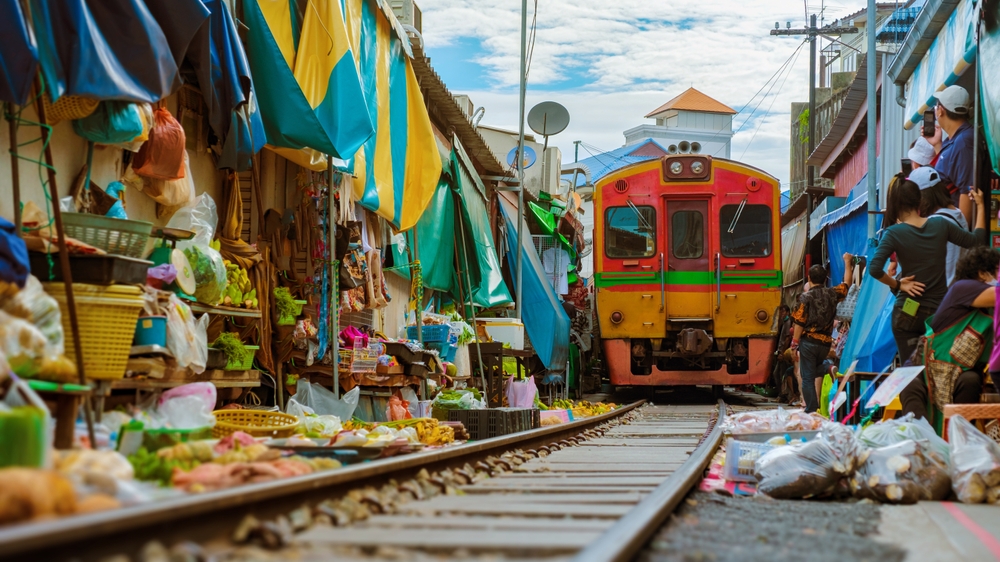
Legal and Tax Information
Thailand’s Tax System for Digital Nomads
Tax Residency Rules
- 180-day rule: Spending 180+ days makes you Thai tax resident
- Income taxation: Residents taxed on Thailand-sourced income
- Foreign income: Generally not taxed unless brought into Thailand
Digital Nomad Tax Considerations
- Tourist visa holders: Generally no tax obligations
- Long-term residents: May need to file tax returns
- Income source: Working for foreign companies typically not taxed
- Professional advice: Recommended for complex situations
Visa Compliance and Regulations
Visa Run Considerations
- Popular destinations: Malaysia, Cambodia, Laos for short trips
- Frequency limits: Excessive visa runs may trigger immigration scrutiny
- Documentation: Keep entry/exit stamps, flight tickets as proof
- Overstay penalties: $33/day fine plus potential entry bans
Work Authorization
- Illegal work: Technically prohibited on tourist visas
- Remote work: Generally tolerated if for foreign companies
- Local employment: Requires work permit and business visa
- Teaching: Popular but requires proper visa and work permit
Healthcare and Safety
Thai Healthcare System
Healthcare Quality
- International hospitals: World-class facilities in Bangkok, Phuket, Chiang Mai
- Medical tourism: Thailand is global leader in medical tourism
- Costs: Significantly lower than Western countries
- English support: International hospitals have English-speaking staff
Health Insurance Options
- Travel insurance: Essential for tourists and short-term visitors
- International insurance: Recommended for long-term stays
- Local insurance: Available for residents
- Self-pay: Many nomads self-insure due to low costs
Popular Healthcare Providers
- Bumrungrad Hospital (Bangkok): JCI-accredited international hospital
- Bangkok Hospital: Chain with locations throughout Thailand
- Chiang Mai Ram Hospital: Northern Thailand’s premier facility
- Samitivej Hospital: High-quality care with multiple locations
Safety and Security
Crime and Safety
- Low violent crime: Thailand generally very safe for tourists
- Petty crime: Bag snatching, pickpocketing in tourist areas
- Scams: Various tourist scams, especially around temples and transport hubs
- Traffic safety: Major concern, especially for motorbike riders
Natural Disasters and Health Risks
- Monsoons: Heavy rains and flooding during rainy season
- Dengue fever: Mosquito-borne illness, use repellent
- Air quality: Pollution issues in Bangkok and during burning season
- Sun exposure: Strong tropical sun requires protection
Cultural Integration
Understanding Thai Culture
Buddhist Influence
- Temple etiquette: Dress modestly, remove shoes, show respect
- Meditation culture: Many opportunities to learn Buddhist meditation
- Karma and merit-making: Important concepts in daily Thai life
- Vegetarian options: Buddhist influence creates many vegetarian restaurants
Social Customs
- Wai greeting: Traditional greeting with palms together
- Respect for monarchy: Strict laws against insulting royal family
- Saving face: Avoid confrontation or causing embarrassment
- Sanuk (fun): Thai emphasis on enjoying life and having fun
Building Relationships with Locals
Thai Hospitality
- “Mai pen rai”: “No problem” attitude central to Thai culture
- Generosity: Thais often very generous with time and assistance
- Food sharing: Meals are social events meant for sharing
- Patience: Thai “jai yen” (cool heart) approach to problems
Professional Networking
- Expat organizations: Many business and social groups for foreigners
- Thai language exchange: Popular way to meet locals and practice language
- Volunteer opportunities: Teaching English, environmental projects
- Cultural festivals: Songkran, Loi Krathong offer cultural immersion
Challenges to Consider
Potential Drawbacks of Living in Thailand
Climate and Environmental Issues
- Intense heat: Year-round temperatures 80-95°F (27-35°C)
- High humidity: Can be exhausting for those unaccustomed
- Air pollution: Serious issues in Bangkok and during burning season
- Monsoon flooding: Disrupts transportation and daily life
Visa and Legal Challenges
- Visa uncertainty: No guaranteed long-term options for most nomads
- Immigration scrutiny: Increased enforcement of visa regulations
- Work restrictions: Limited legal options for local employment
- Bureaucratic complexity: Government processes often slow and confusing
Cultural and Social Considerations
- Language barrier: Thai language very difficult for English speakers
- Cultural misunderstandings: Different approaches to time, relationships, business
- Noise pollution: Urban areas very loud, different noise tolerance
- Western bubble: Easy to remain isolated from authentic Thai culture
Infrastructure Limitations
- Traffic congestion: Major problem in Bangkok and popular destinations
- Inconsistent services: Quality varies dramatically between locations
- Power outages: Occasional issues, especially on islands
- Internet reliability: Can be poor in rural areas or during storms
Frequently Asked Questions
What’s the best visa option for digital nomads in Thailand? The new Destination Thailand Visa (DTV) is ideal for those with $15,000 bank balance, offering 5 years multiple entry. For shorter stays, tourist visas or visa exemptions work well.
How much money do I need to live comfortably in Thailand as a digital nomad? Budget $800-1,200/month for comfortable living in most areas. Bangkok and popular islands cost more ($1,400-2,500/month), while Chiang Mai and smaller cities cost less ($600-1,200/month).
Is it legal to work remotely for foreign companies while in Thailand? While technically prohibited on tourist visas, remote work for foreign companies is generally tolerated. The DTV specifically allows remote work. Always comply with your home country’s tax obligations.
Do I need to speak Thai to live there as a digital nomad? Basic Thai significantly improves daily life, but English is widely spoken in expat areas and tourist zones. Learning key phrases shows respect and helps with local interactions.
Is Thailand safe for solo female digital nomads? Thailand is generally very safe with low violent crime rates. Exercise normal precautions, especially regarding traffic safety and drinking situations. The large expat community provides additional support networks.
Can I open a Thai bank account as a digital nomad? Opening bank accounts on tourist visas is challenging but possible, often requiring agent assistance. The DTV visa should make banking easier. Consider international banks or digital services as alternatives.
Conclusion
Thailand represents the quintessential digital nomad destination, offering an unmatched combination of affordability, lifestyle, infrastructure, and cultural richness that has attracted location-independent professionals for over a decade. With the introduction of the Destination Thailand Visa in 2024, the country has demonstrated its commitment to attracting long-term remote workers while maintaining its position as Southeast Asia’s nomad capital.
Whether you’re drawn to Bangkok’s urban energy and business opportunities, Chiang Mai’s mountain serenity and strong nomad community, the tropical paradise of Thailand’s islands, or the cultural immersion available throughout the kingdom, Thailand provides environments to suit every digital nomad’s preferences and budget.
The country’s combination of ancient Buddhist culture, modern infrastructure, incredible cuisine, and warm hospitality creates an environment where productivity and personal growth can flourish simultaneously. While challenges exist around visa complexity, climate adaptation, and cultural integration, the rewards of experiencing Thailand’s unique blend of tradition and modernity make it an exceptional choice for remote workers.
As Thailand continues to evolve its visa policies and infrastructure to better serve digital nomads, its appeal will likely grow even further. The kingdom’s strategic location also makes it an ideal base for exploring broader Southeast Asia while maintaining a stable, comfortable home base.
For digital nomads seeking a destination that offers both professional opportunity and life-changing cultural experiences, Thailand delivers an unparalleled combination of value, adventure, and community that explains why so many remote workers choose to make it their long-term base in Asia.
The key to success in Thailand is embracing its rhythms, respecting its culture, and building genuine connections with both the local and international communities. Those who approach Thailand with openness and cultural sensitivity will find it offers not just a place to work remotely, but a transformative experience that enriches both professional and personal development.
Ready to make your digital nomad dreams a reality? Download our comprehensive Digital Nomad Visa Guide for detailed requirements and official resources for each destination.
Connect with fellow location-independent professionals by joining our exclusive Sojrn Digital Nomad Community for ongoing support, insider tips, and updates to enhance your borderless lifestyle.





